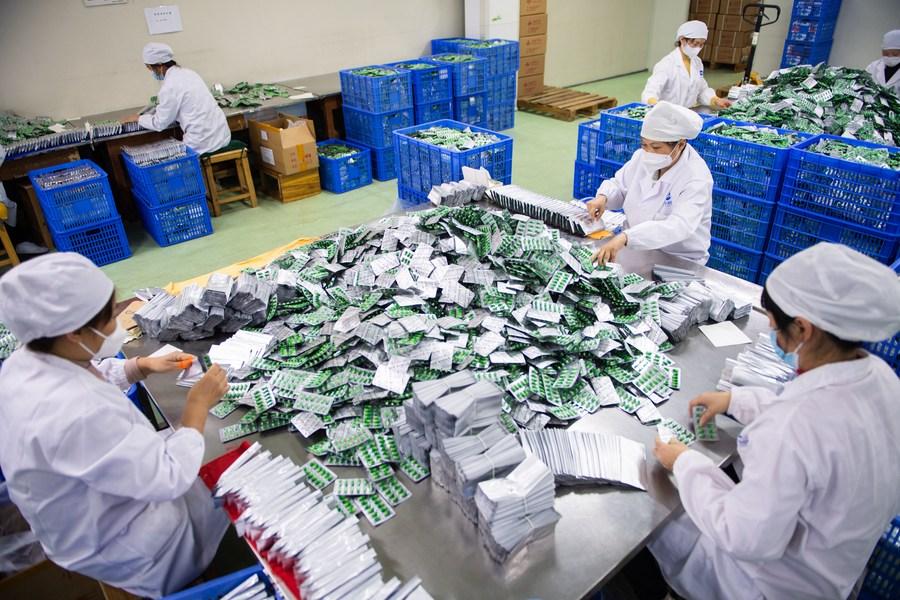

Staff members pack medicines at a pharmaceutical company in central China's Hunan Province, Dec. 19, 2022. [Photo/Xinhua]
class="" data-mce-style="text-align: left; font-size: 14pt; font-family: Consolas;" style="text-align: left; margin-bottom: 15px;">China is implementing swift and concrete measures to accelerate drug development, production and supply in order to guarantee better treatment of COVID-19 cases, as the country adjusts its epidemic response policy.
Weakened pathogenicity of the virus, a high vaccination rate and the accumulation of experience in prevention and control, have allowed China to optimize its COVID-19 response this winter.
The current focus of China's epidemic response has shifted from preventing infections to beefing up treatment of severe cases, which has greatly increased demand for relevant drugs, both from self-quarantined patients at home and from severe cases in hospital.
Broaden options
Chinese drug researchers and developers have been racing against the clock to find the right medicine to beat the virus in two ways: biological macromolecular drugs based on antibodies and small molecular compounds that can inhibit virus invasion and replication.
A China-developed oral antiviral agent called VV116, which is a potent anti-COVID-19 drug, has been proven as effective as Pfizer's Paxlovid in increasing the speed of clinical recovery, and it has shown improved performance during the early onset of Omicron infections, according to a study recently published in the New England Journal of Medicine.
China has kept broadening its range of options. Its drug regulator has granted conditional approval for the import of the Paxlovid COVID-19 pill.
It has also activated special approval procedures and granted conditional approval for the import registration of Merck's COVID-19 treatment Molnupiravir -- for adult patients with mild to moderate COVID-19 symptoms and a high risk of progressing to severe cases.
The small-molecule oral drug can be given to patients who, for instance, are elderly, overweight, or have chronic renal diseases, diabetes, severe cardiovascular diseases, and chronic lung diseases.
Traditional Chinese Medicine (TCM) has also been widely applied and has shown unique benefits in the treatment of COVID-19 infections.
For those with severe symptoms, integrated treatment with Chinese and Western medicine can effectively prevent the disease from becoming more severe or at least slow the development of more severe symptoms, thus reducing the fatality rate, said Huang Luqi, deputy head of the National Administration of Traditional Chinese Medicine, at a recent national media conference.
Ensure supply
Targeting classic symptoms of the infection, China has improved its production capacity for fever and pain relievers ibuprofen and paracetamol.
The country's daily production capacity of ibuprofen and paracetamol has exceeded 200 million tablets, while the daily output reached 190 million. In addition, the maximum daily output of children's antipyretic medicine has reached 1.12 million bottles.
There are 194 types of antipyretic, antitussive, antibacterial and antiviral drugs on the Chinese market.
Enterprises have increased drug development and distribution efforts. Jilin Natu Pharmaceutical Co., Ltd. has developed and manufactured new products which assist in enhancing patients' resistance, clearing fever, detoxifying, and reducing inflammation.
A pharmaceutical company in Zibo city, east China's Shandong Province, has increased its production capacity by more than 60 percent. All its production lines and employees are required to give priority to the production of COVID-19 treatment drugs.
Medical enterprises in the northwestern Gansu Province's Minxian County, home to TCM herbs, are working hard to produce key medicines, such as cough medicines. At present, the daily output of key medicines for COVID-19 control in this region totals 150,000 boxes and TCM preparations reach 200,000 bags.
Reaching grassroots level
China is paying special attention to drug distribution and emergency reserves for elderly people and for people in rural and remote areas, as it optimizes its COVID-19 response.
Village doctors play an important role in this regard. Yang Pengcheng, a rural doctor in Baoding, north China's Hebei Province, has been on a tight schedule lately, delivering medicine to 50 or 60 households with COVID-19 patients daily.
Yang begins by decocting TCM according to the formula recommended by the county's health bureau and based on each patient's condition. After that, the veteran doctor embarks on a long trip, delivering boiled TCM remedies to the patients from house to house.
He also carries his usual medical bag with antipyretic medicine, and his sphygmomanometer, pulse oximeter, thermometer and stethoscope, to check the patients' health conditions.
"Not so long ago, my whole family contracted COVID-19. So I called our village doctors, and they brought us TCM decoctions and other Western medicine," said Yang Shaokun, a villager.
In Baoding, there are more than 7,700 rural doctors like Yang Pengcheng. In Zhujiayu Village alone, 12 rural doctors protect the health of more than 6,500 villagers, including over 600 elderly aged 65 and above, many of whom have difficulty walking.
Grassroots units of the government and other social forces are also mobilized to deliver medicines and help patients in need.
In Fuzhou, capital of east China's Fujian Province, government and community workers delivered care packages containing ibuprofen and other medical supplies to vulnerable groups such as seniors living alone.
Online distribution of medical supplies via e-commerce platforms has been launched in 11 provincial-level regions, benefiting over 2 million patients -- most of whom are in remote rural areas.
The country has also strengthened cross-region transfers of medical supplies. By Dec. 28, 2022, over 174 million ibuprofen tablets and 60 million paracetamol tablets had been allocated to key areas across the country.
